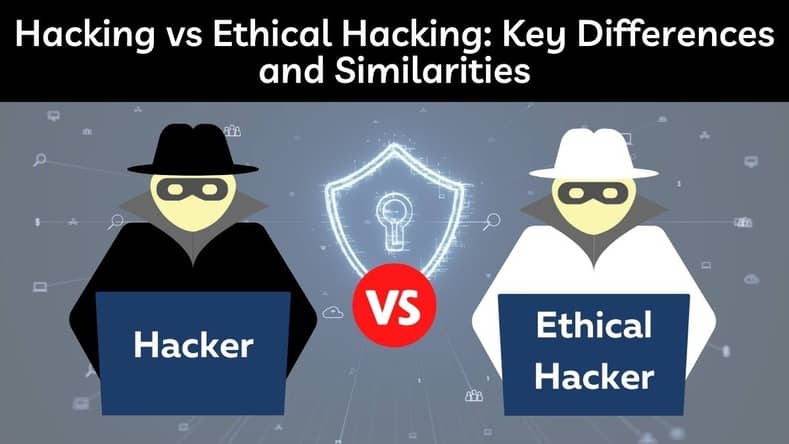Hacking and ethical hacking are related concepts, but they have different intentions and legal implications. Here’s an overview of their differences:
Hacking:
- Intent: Hacking typically involves unauthorized access to computer systems, networks, or applications with the intent to exploit vulnerabilities, steal data, or disrupt services. The motivation behind hacking can vary, including financial gain, espionage, activism, or simply the challenge.
- Legality: Hacking is illegal in most jurisdictions, as it violates privacy and property rights. Unauthorized access to computer systems can result in criminal charges and penalties, depending on the severity and impact of the hacking activity.
- Ethics: Hacking is generally considered unethical, as it involves unauthorized access and exploitation of systems, which can harm individuals or organizations. It often leads to financial losses, reputation damage, or privacy breaches.
Ethical Hacking (Penetration Testing):
- Intent: Ethical hacking involves authorized access to computer systems, networks, or applications with the explicit goal of identifying vulnerabilities and weaknesses. The purpose of ethical hacking is to help organizations improve their security posture by uncovering flaws and recommending remediation strategies.
- Legality: Ethical hacking is legal when performed with proper authorization and consent from the organization or system owner. Many organizations hire ethical hackers (or penetration testers) to test their security measures proactively.
- Ethics: Ethical hacking is considered a responsible and necessary practice, as it helps organizations identify and address security vulnerabilities. Ethical hackers adhere to a code of conduct, ensuring that they respect the confidentiality, integrity, and availability of the systems they are testing.
Ethical hacking, also known as penetration testing, is a legitimate and legal practice where security professionals attempt to identify and exploit vulnerabilities in systems, networks, or applications with the explicit consent of the organization or owner. The goal is to uncover security weaknesses and help organizations to improve their security posture.

6 steps to follow as an ethical hacker:
- Obtain permission: Make sure you have written consent from the organization or individual whose system you intend to test. Unauthorized hacking is illegal and unethical.
- Understand the scope: Define the scope of the penetration test, including which systems, networks, or applications will be tested, and any limitations or boundaries.
- Research and gather information: Understand the target environment and gather as much information as possible about it. This may include network topology, software, hardware, and potential vulnerabilities.
- Plan and conduct the tests: Create a plan outlining the testing methodologies and techniques you’ll use. Common methods include vulnerability scanning, password cracking, social engineering, and exploiting known vulnerabilities.
- Analyze and report: Document your findings, including the vulnerabilities discovered, the risk associated with each, and possible remediation strategies. Present this report to the organization for review and action.
- Follow up: Work with the organization to help them address the identified vulnerabilities and verify that they have been properly resolved.
Remember that the goal of ethical hacking is to help organizations improve their security posture. If you are looking for resources to learn ethical hacking. Consider taking online courses, attending workshops, or obtaining certifications like CEH (Certified Ethical Hacker) or OSCP (Offensive Security Certified Professional). These resources will help you gain the skills needed to perform penetration testing in an ethical and responsible manner
In summary, hacking is an unauthorized and illegal activity aimed at exploiting systems for various purposes. While ethical hacking is a legal and responsible practice that aims to help organizations identify and fix security weaknesses.
